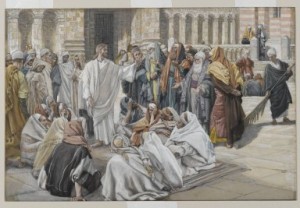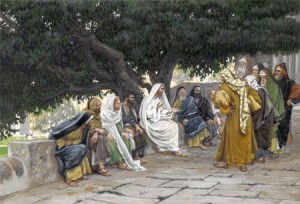“I will raise you up at the last day”
[powerpress]
an excerpt from today’s reflection by Don Schwager:
Jesus makes a claim only God can make: He is the true bread of heaven that can satisfy the deepest hunger we experience. The manna from heaven prefigured the superabundance of the unique bread of the Eucharist or Lord’s Supper which Jesus gave to his disciples on the eve of his sacrifice. The manna in the wilderness sustained the Israelites on their journey to the Promised Land. It could not produce eternal life for the Israelites. The bread which Jesus offers his disciples sustains us not only on our journey to the heavenly paradise, it gives us the abundant supernatural life of God which sustains us for all eternity.
When we receive from the Lord’s table we unite ourselves to Jesus Christ, who makes us sharers in his body and blood and partakers of his divine life. Ignatius of Antioch (35-107 A.D.) calls it the “one bread that provides the medicine of immortality, the antidote for death, and the food that makes us live for ever in Jesus Christ” (Ad Eph. 20,2). This supernatural food is healing for both body and soul and strength for our journey heavenward.
Jesus offers us the abundant supernatural life of heaven itself – but we can miss it or even refuse it. To refuse Jesus is to refuse eternal life, unending life with the Heavenly Father. To accept Jesus as the bread of heaven is not only life and spiritual nourishment for this world but glory in the world to come. When you approach the Table of the Lord, what do you expect to receive? Healing, pardon, comfort, and rest for your soul? The Lord has much more for us, more than we can ask or imagine. The principal fruit of receiving the Eucharist or Lord’s Supper is an intimate union with Christ. As bodily nourishment restores lost strength, so the Eucharist strengthens us in charity and enables us to break with disordered attachments to creatures and to be more firmly rooted in the love of Christ. Do you hunger for the “bread of life”?
“Lord Jesus, you are the living bread which sustains me in this life. May I always hunger for the bread which comes from heaven and find in it the nourishment and strength I need to love and serve you wholeheartedly. May I always live in the joy, peace, and unity of the Father, Son, and Holy Spirit, both now and in the age to come.”
for the full reflection visit : Daily Reading and Meditation
Tags: bread of heaven, catholic, catholic podcast, catholic prayer, cathollc spirituality, jesus christ, Lord Jesus
This entry was posted on Thursday, May 8th, 2014 at 8:34 am
You can follow any responses to this entry through the RSS 2.0 feed.
“If anyone eats of this bread, he will live for ever”
[powerpress]
an excerpt from today’s reflection by Don Schwager: 
Jesus makes a claim only God can make: He is the true bread of heaven that can satisfy the deepest hunger we experience. The manna from heaven prefigured the superabundance of the unique bread of the Eucharist or Lord’s Supper which Jesus gave to his disciples on the eve of his sacrifice. The manna in the wilderness sustained the Israelites on their journey to the Promised Land. It could not produce eternal life for the Israelites. The bread which Jesus offers his disciples sustains us not only on our journey to the heavenly paradise, it gives us the abundant supernatural life of God which sustains us for all eternity. When we receive from the Lord’s table we unite ourselves to Jesus Christ, who makes us sharers in his body and blood and partakers of his divine life. Ignatius of Antioch (35-107 A.D.) calls it the “one bread that provides the medicine of immortality, the antidote for death, and the food that makes us live for ever in Jesus Christ” (Ad Eph. 20,2). This supernatural food is healing for both body and soul and strength for our journey heavenward.
Jesus offers us the abundant supernatural life of heaven itself – but we can miss it or even refuse it. To refuse Jesus is to refuse eternal life, unending life with the Heavenly Father. To accept Jesus as the bread of heaven is not only life and spiritual nourishment for this world but glory in the world to come. When you approach the Table of the Lord, what do you expect to receive? Healing, pardon, comfort, and rest for your soul? The Lord has much more for us, more than we can ask or imagine. The principal fruit of receiving the Eucharist or Lord’s Supper is an intimate union with Christ. As bodily nourishment restores lost strength, so the Eucharist strengthens us in charity and enables us to break with disordered attachments to creatures and to be more firmly rooted in the love of Christ. Do you hunger for the “bread of life”?
“Lord Jesus, you are the living bread which sustains me in this life. May I always hunger for the bread which comes from heaven and find in it the nourishment and strength I need to love and serve you wholeheartedly. May I always live in the joy, peace, and unity of the Father, Son, and Holy Spirit, both now and in the age to come.”
for the full reflection visit : Daily Reading and Meditation
Tags: bread of heaven, catholic, catholic podcast, catholic prayer, cathollc spirituality, jesus christ, Lord Jesus
This entry was posted on Wednesday, May 7th, 2014 at 12:03 am
You can follow any responses to this entry through the RSS 2.0 feed.
“John saw the empty tomb and believed”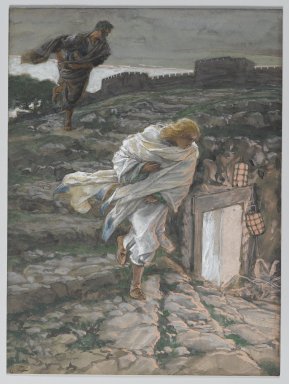
[powerpress]
an excerpt from today’s reflection by Don Schwager:
What was it like for the disciple who had stood at the cross of Jesus and then laid him in a tomb on Good Friday, to come back three days later and discover that the sealed tomb was now empty? John, along with Peter, was the first apostle to reach the tomb of Jesus on Easter Sunday morning. Like Mary Magdalene and the other disciples, John was not ready to see an empty tomb and to hear the angel’s message, Why do you seek the living among the dead (Luke 24:5)? What did John see in the tomb that led him to believe in the resurrection of Jesus? It was certainly not a dead body. The dead body of Jesus would have disproven the resurrection and made his death a tragic conclusion to a glorious career as a great teacher and miracle worker. When John saw the empty tomb he must have recalled Jesus’ prophecy that he would rise again after three days. Through the gift of faith John realized that no tomb on earth could contain the Lord and giver of life. John saw and believed (John 20:8).
John had to first deal with the empty tomb before he could meet the risen Lord later that evening along with the other apostles who had locked themselves in the upper room out of fear of the Jewish authorities (John 20:19-23). John testified as an eye-witness to the life, death, and resurrection of Jesus Christ: What we have seen, heard, and touched we proclaim as the eternal word of life which existed from the beginning (1 John 1:1-4). John bears witness to what has existed from all eternity. This “word of life” is Jesus the word incarnate, but also Jesus as the word announced by the prophets and Jesus the word now preached throughout the Christian church for all ages to come.
One thing is certain, if Jesus had not risen from the dead and appeared to his disciples, we would never have heard of him. Nothing else could have changed sad and despairing men and women into people radiant with joy and courage. The reality of the resurrection is the central fact of the Christian faith. Through the gift of the Holy Spirit, the Lord gives us “eyes of faith” to know him and the power of his resurrection. The greatest joy we can have is to encounter the living Christ and to know him personally as our Lord and Savior. Do you accept the good news of Jesus’ death and resurrection with skeptical doubt and disbelief or with trusting faith and joyful wonderment?
“Lord Jesus Christ, you have triumphed over the grave and you have won for us new life and resurrection power. Give me the eyes of faith to see you in your glory. Help me to draw near to you and to grow in the knowledge of your great love for us and your great victory over sin and death.”
for the full reflection visit : Daily Reading and Meditation
Tags: catholic, catholic podcast, catholic prayer
This entry was posted on Sunday, April 20th, 2014 at 7:49 am
You can follow any responses to this entry through the RSS 2.0 feed.
“It is finished”
[powerpress]
an excerpt from today’s reflection by Don Schwager: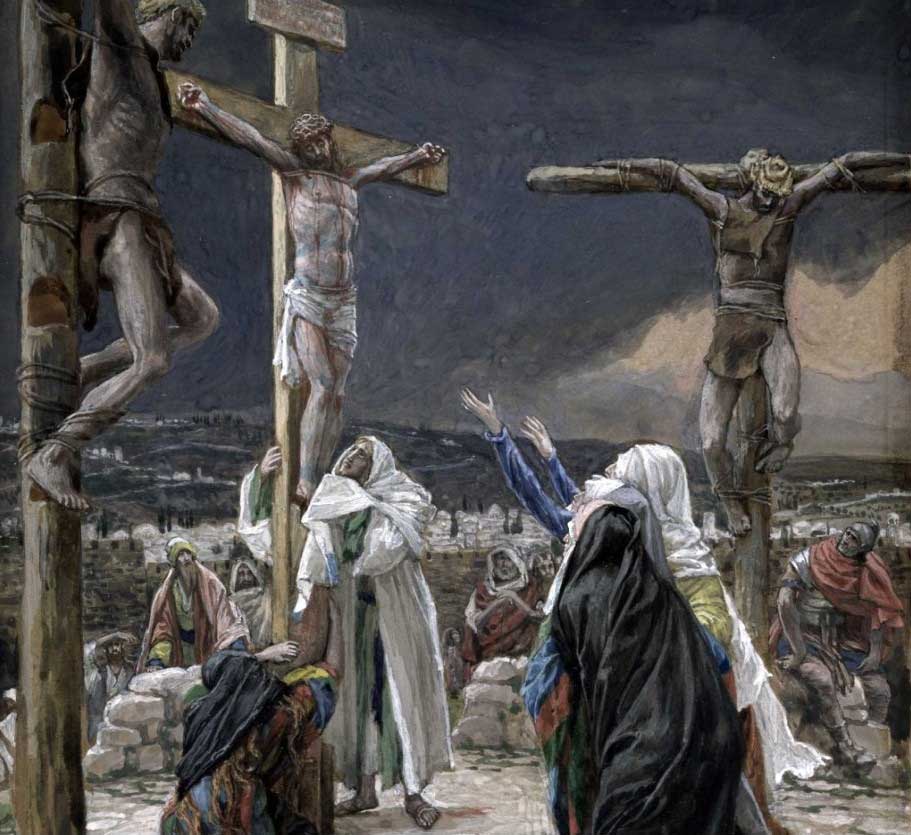
We can find no greater proof of God’s love for us than the willing sacrifice of his Son on the cross. Jesus’ parting words, “It is finished!” express triumph rather than defeat. Jesus bowed his head and gave up his spirit knowing that the strife was now over and the battle was won. Even on the cross Jesus knew the joy of victory. What the Father sent him into the world to do has now been accomplished. Christ offered himself without blemish to God and he put away sin by the sacrifice of himself (see Hebrews 9:24-26). Augustine of Hippo (430-543 A.D) comments on those who stood at the cross of Jesus:
“As they were looking on, so we too gaze on his wounds as he hangs. We see his blood as he dies. We see the price offered by the redeemer, touch the scars of his resurrection. He bows his head, as if to kiss you. His heart is made bare open, as it were, in love to you. His arms are extended that he may embrace you. His whole body is displayed for your redemption. Ponder how great these things are. Let all this be rightly weighed in your mind: as he was once fixed to the cross in every part of his body for you, so he may now be fixed in every part of your soul.” (GMI 248)
In the cross of Christ we see the triumph of Jesus over his enemies – sin, Satan, and death. Christian writers down through the centuries have sung the praises of the Cross of Christ. Paul the Apostle exclaimed, “But far be it from me to glory except in the cross of our Lord Jesus Christ” (Galatians 6:14). Hear what Gregory Nazianzen (329-389 AD), an early church father and bishop of Constantinople, wrote about the triumph of Christ’s exaltation on the cross :
“Many indeed are the wondrous happenings of that time: God hanging from a cross, the sun made dark and again flaming out; for it was fitting that creation should mourn with its creator. The temple veil rent, blood and water flowing from his side: the one as from a man, the other as from what was above man; the earth shaken, the rocks shattered because of the rock; the dead risen to bear witness to the final and universal resurrection of the dead. The happenings at the sepulcher and after the sepulcher, who can fittingly recount them? Yet no one of them can be compared to the miracle of my salvation. A few drops of blood renew the whole world, and do for all men what the rennet does for the milk: joining us and binding us together. (On the Holy Pasch, Oration 45.1)
Rupert of Deutz (1075-1129), a Benedictine theologian and abbot, wrote:
“The cross of Christ is the door to heaven, the key to paradise, the downfall of the devil, the uplifting of mankind, the consolation of our imprisonment, the prize for our freedom.”
The Cross of Christ is the safeguard of our faith, the assurance of our hope, and the throne of love. It is also the sign of God’s mercy and the proof of forgiveness. By his cross Jesus Christ has pardoned us and set us free from the tyranny of sin. He paid the price for us when he made atonement for our sins. The way to peace, joy, and righteousness in the kingdom of God and the way to victory over sin and corruption, fear and defeat, despair and death is through the cross of Jesus Christ. Do you follow the Lord Jesus in his way of the cross with joy, hope, and confidence? “Lord Jesus Christ, by your death on the cross you have won pardon for us and freedom from the tyranny of sin and death. May I live in the joy and freedom of your victory over sin and death.” for the full reflection visit : Daily Reading and Meditation
Tags: catholic, catholic podcast, catholic prayer
This entry was posted on Friday, April 18th, 2014 at 6:21 am
You can follow any responses to this entry through the RSS 2.0 feed.
“How much more will your Father who is in heaven give good things to those who ask him!”
[powerpress]
an excerpt from today’s reflection by Don Schwager: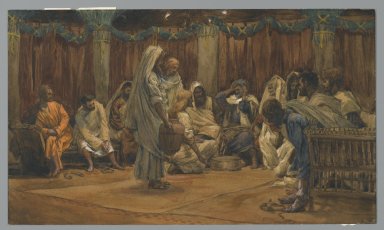
Does your love waver when you encounter bitter disappointments and injury from others? As Jesus’ hour of humiliation draws near he reveals to his disciples the supreme humility which shaped the love he had for them. He stoops to perform a menial task reserved for servants – the washing of smelly, dirty feet. In stooping to serve his disciples Jesus knew he would be betrayed by one of them and that the rest would abandon him through disloyalty. Such knowledge could have easily led to bitterness or hatred. Jesus met the injury of betrayal and disloyalty with the greatest humility and supreme love.
Jesus loved his disciples to the very end, even when they failed him and forsook him. The Lord loves each of us unconditionally. His love has power to set us free to serve others with Christ-like compassion and humility. Does the love of Christ rule in your heart, thoughts, intentions and actions?
Saint Augustine of Hippo in his sermon for this day, wrote:
“He had the power of laying down his life; we by contrast cannot choose the length of our lives, and we die even if it is against our will. He, by dying, destroyed death in himself; we are freed from death only in his death. His body did not see corruption; our body will see corruption and only then be clothed through him in incorruption at the end of the world. He needed no help from us in saving us; without him we can do nothing. He gave himself to us as the vine to the branches; apart from him we cannot have life.Finally, even if brothers die for brothers, yet no martyr by shedding his blood brings forgiveness for the sins of his brothers, as Christ brought forgiveness to us. In this he gave us, not an example to imitate but a reason for rejoicing. Inasmuch, then, as they shed their blood for their brothers, the martyrs provided “the same kind of meal” as they had received at the Lord’s table. Let us then love one another as Christ also loved us and gave himself up for us.”
“Lord Jesus, your love conquers all and never fails. Help me to love others freely, with heart-felt compassion , kindness and goodness. Where there is injury, may I sow peace rather than strife.”
for the full reflection visit : Daily Reading and Meditation
Tags: catholic, catholic podcast, catholic prayer
This entry was posted on Thursday, April 17th, 2014 at 11:14 am
You can follow any responses to this entry through the RSS 2.0 feed.
The tragedy of the betrayal
[powerpress]
an excerpt from today’s reflection by Don Schwager: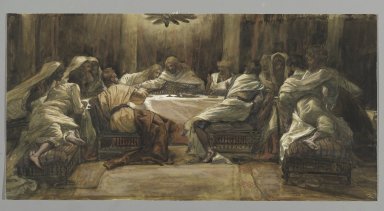
Why did Judas betray his Master? Was his treachery motivated by greed, bitter disappointment with Jesus, or hatred because of disillusionment? It may be that Judas never intended for his Master to die. Maybe he thought Jesus was proceeding too slowly and not acting aggressively enough in setting up his messianic kingdom. Perhaps Judas wanted to force Jesus’ hand by compelling him to act. Nonetheless, his tragedy was his refusal to accept Jesus as he was.
Origen, a 3rd century bible scholar and church father, comments on Judas’ betrayal: “Let us consider what Judas said to the Jewish priests: What will you give me if I hand him over to you? He was willing to take money in exchange for handing over the Word of God. They do the same thing who accept sensual or worldly goods in exchange for handing over and casting out from their souls the Savior and Word of truth who came to dwell with them. Indeed, it would be fitting to apply Judas’s example to all who show contempt for the Word of God and betray him, as it were, by committing sin for the sake of money or for any selfish motive. People who behave in this way appear openly to be calling out to the powers of the enemy who offer worldly gain in return for the sin of betraying God’s Word, saying, What will you give me if I hand him over to you? And they gave him thirty pieces of silver. The number of coins they gave Judas was equivalent to the number of years the Savior had sojourned in this world. For at the age of thirty, he was baptized and began to preach the gospel, like Joseph was thirty years old when he began to gather grain for his brothers (Genesis 41:46). Just as at that time the grain was prepared by God for the sons of Israel but given also to the Egyptians, so also the gospel was prepared for the saints but preached also to the unfaithful and wicked.†[Commentary on Matthew 78.]
Jesus knew beforehand what would befall him. As Jesus ate the passover meal with his twelve apostles he put them under trial and suspicion (one of you will betray me) to teach them to examine themselves rightly, lest they be highminded and think themselves more strong than they were. We, also must examine ourselves in the light of God’s truth and grace and ask him to strengthen us in faith, hope, and love that we may not fail him or forsake him when we are tempted. Do you pray with confidence in the words Jesus gave us to pray: Do not lead us into temptation, but deliver us from evil (Matthew 6:13)?
“God our Father, we are exceedingly frail and indisposed to every virtuous and gallant undertaking. Strengthen our weakness, we beseech you, that we may do valiantly in this spiritual war; help us against our own negligence and cowardice, and defend us from the treachery of our unfaithful hearts; for Jesus Christ’s sake.” (Prayer of Thomas a Kempis)
for the full reflection visit : Daily Reading and Meditation
Tags: catholic, catholic podcast, catholic prayer
This entry was posted on Wednesday, April 16th, 2014 at 12:09 am
You can follow any responses to this entry through the RSS 2.0 feed.
“Extravagant love for Jesus“
[powerpress]
an excerpt from today’s reflection by Don Schwager: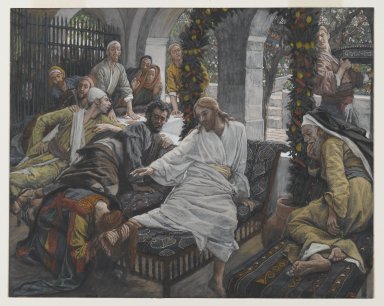
Do you know the love that knows no bounds? As Jesus dines with his beloved friends, Mary does something which only love can do. She took the most precious thing she had and spent it all on Jesus. Her love was not calculated but extravagant. Mary’s action was motivated by one thing, and one thing only, namely, her love for Jesus and her gratitude for God’s mercy. She did something, however, a Jewish woman would never do in public. She loosed her hair and anointed Jesus with her tears. It was customary for a woman on her wedding day to bound her hair. For a married woman to loosen her hair in public was a sign of grave immodesty. Mary was oblivious to all around her, except for Jesus. She took no thought for what others would think, but what would please her Lord. In humility she stooped to anoint Jesus’ feet and to dry them with her hair. How do you anoint the Lord’s feet and show him your love and gratitude?
The gospel records that the whole house was filled with the perfume of the ointment. What Mary had done brought sweetness not only in the physical sense, but the spiritual sense as well. Her lovely deed shows the extravagance of love – a love that we cannot outmatch. The Lord Jesus showed us the extravagance of his love in giving the best he had by pouring out his own blood for our sake and by anointing us with his Holy Spirit. The Apostle Paul says that nothing will be able to separate us from the love of God in Christ Jesus (Romans 8:39). Do you allow the love of Christ to rule in all your thoughts and intentions, and in all your words and deeds?
Why was Judas critical of Mary’s lovely deed? Judas viewed her act as extravagant wastefulness because of greed. A person views things according to what it inside the heart and soul. Judas was an embittered man and had a warped sense of what was precious and valuable, especially to God. Jesus had put Judas in charge of their common purse, no doubt because he was gifted in financial matters. The greatest temptation we can face will often come in the area of our greatest strength or gifting. Judas used money entrusted to him for wrong and hurtful purposes. He allowed greed and personal gain to corrupt his heart and to warp his view of things. He was critical towards Mary because he imputed unworthy motives. Do you examine your heart correctly when you impute wrong or unworthy motives towards others?
“Give us, Lord, a lively faith, a firm hope, a fervent charity, a love of you. Take from us all lukewarmness in meditation, dullness in prayer. Give us fervor and delight in thinking of you and your grace, your tender compassion towards me. The things we pray for, good Lord, give us grace to labor for: through Jesus Christ our Lord.” (Prayer of Sir Thomas More, 16th century)
for the full reflection visit : Daily Reading and Meditation
Tags: catholic, catholic podcast, catholic prayer
This entry was posted on Monday, April 14th, 2014 at 6:41 am
You can follow any responses to this entry through the RSS 2.0 feed.
“I am the Son of God”
[powerpress]
an excerpt from today’s reflection by Don Schwager: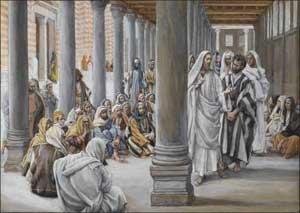
Is your life consecrated to God? The scriptural understanding of consecration is to make holy for God – to be given over as a free-will offering and sacrifice for God. Jesus made himself a sin-offering for us, to ransom us from condemnation and slavery to sin. He spoke of his Father consecrating him for this mission of salvation. Why were the religious leaders so upset with Jesus that they wanted to kill him? They charged him with blasphemy because he claimed to be the Son of God. Jesus made two claims in his response: He was consecrated by the Father to a special task and he was sent into the world to carry out his Father’s mission. Jesus challenged his opponents to accept his works if they could not accept his words. One can argue with words, but deeds are beyond argument. Jesus is the perfect teacher in that he does not base his claims on what he says but on what he does. The word of God is life and power to those who believe. Jesus shows us the way to walk the path of truth and holiness. And he anoints us with his power to live the gospel with joy and to be his witnesses in the world. Are you a doer of God’s word, or a forgetful hearer only?
“Write upon my heart, O Lord, the lessons of your holy word, and grant that I may be a doer of your word, and not a forgetful hearer only.”
for the full reflection visit : Daily Reading and Meditation
Tags: catholic, catholic podcast, catholic prayer
This entry was posted on Friday, April 11th, 2014 at 12:08 am
You can follow any responses to this entry through the RSS 2.0 feed.
[powerpress]
an excerpt from today’s reflection by Don Schwager:
Jesus challenged the people of Israel to accept his word as the very revelation of God himself. His claim challenged the very foundation of their belief and understanding of God. Jesus made a series of claims which are the very foundation of his life and mission. What are these claims? First, Jesus claims unique knowledge of God as the only begotten Son of the Father in heaven. Since he claims to be in direct personal communion with his Father in heaven, he knows everything about the Father. Jesus claims that the only way to full knowledge of the mind and heart of God is through himself. Jesus also claims unique obedience to God the Father. He thinks, lives and acts in the knowledge of his Father’s word. To look at his life is to “see how God wishes me to live.” In Jesus alone we see what God wants us to know and what he wants us to be.
When the Jewish authorities asked Jesus who do you claim to be? he answered, “before Abraham was, I am.” Jesus claims to be timeless and there is only one in the universe who is timeless, namely God. Scripture tells us that “Jesus Christ is the same yesterday and today and forever” (Hebrews 13:8). Jesus was not just a man who came, lived, died, and then rose again. He is the immortal timeless One, who always was and always will be. In Jesus we see the eternal God in visible flesh. He is God who became a man for our sake and for our salvation. His death and resurrection make it possible for us to share in his immortality. Do you believe the words of Jesus and obey them with all your heart, mind, and strength?
“Lord Jesus, let your word be on my lips and in my heart that I may walk in the freedom of your everlasting love, truth and goodness.”
for the full reflection visit : Daily Reading and Meditation
Tags: catholic, catholic podcast, catholic prayer
This entry was posted on Thursday, April 10th, 2014 at 12:06 am
You can follow any responses to this entry through the RSS 2.0 feed.
“The truth will make you free”
an excerpt from today’s reflection by Don Schwager:
True and false sources of identity
The scribes and Pharisees, who were the religious authorities of the Jews, questioned Jesus’ authority to speak and act in God’s name. They questioned Jesus’ claim to forgive sins and to set people free from slavery to sin. They understood that only God had power to forgive sins and to release people from their burden of guilt and shame. They refused to accept that Jesus’ authority was given to him by his Father in heaven. Jesus tells them that they think evil of him and desire to kill him because they are under the influence and power of the “father of lies” who is opposed to the one true Father and Creator who made us in his image and likeness (Genesis 1:26-27).
Jesus explains that he is speaking of two different senses of “fatherhood”. The first is a physical identity through natural fatherhood. And the second and more significant identity is a self-chosen one that is the result of being led and formed in a moral way of thinking and living one’s life that has been shaped through the example, words, and influence of someone we are consciously or unconsciously following and imitating.
We do not grow or learn in a vacuum. We are shaped for better or for worse by those we choose to imitate and follow. Sin leads us away from God’s truth and the help he gives us to follow him. Slavery to sin is ultimately rooted in the father of lies (John 8:44), whom Scripture calls the devil (Luke 4:1) and Satan (Luke 10:18), the ruler of this present world who is opposed to God (John 12:31; 2 Corinthians 4:4).
True freedom comes from God
The freedom which Jesus offers his followers is freedom from the power of sin, Satan, and the worldly influence of those who oppose God and his ways. We are powerless to set ourselves free from bondage to Satan, sin, and death (Romans 3:23; 5:6). That is why the Lord Jesus took our sins upon himself and nailed them to the cross (1 Peter 2:24; Isaiah 53:5-6; Colossians 2:14). His death on the cross has won victory and pardon for us, and peace with God. Through Jesus’ sacrifice we are not only forgiven and reconciled with God – we become the adopted sons and daughters of God (Romans 8:14-16). We can call God our Father because the Lord Jesus has reconciled us and redeemed us from slavery to sin and Satan.
A redeemed slave is not entirely free until all of his chains and weights have been broken and destroyed. The Lord Jesus alone has the power to release us from every chain and burden that would keep us in bondage to sinful habits and hurtful desires. Are there any chains – any sinful patterns, harmful attitudes, and addictive behavior – that you need to be released from? Allow the Lord Jesus to unbind you and bring you healing, pardon, and freedom to walk in his way of love and truth. The Lord Jesus sets us freefrom slavery to our own selfishness and sinful desires in order to set us free for a joy-filled life of love and service for his kingdom. Paul the Apostle reminds us that Christ has won freedom for each one of us – not to serve ourselves or do as we please – but rather to please the Lord and to serve our neighbors in love for their sake (Galatians 5:1,13). Do you accept and believe Christ’s word of truth, love, and freedom for your life?
“Lord Jesus, write your words of love and truth upon my heart and make me a diligent student and a worthy disciple of your word.”
for the full reflection visit : Daily Reading and Meditation
Tags: Lord Jesus
This entry was posted on Wednesday, April 9th, 2014 at 12:07 am
You can follow any responses to this entry through the RSS 2.0 feed.
“When you have lifted up the Son of man, then you will know that I am he”
[powerpress]
an excerpt from today’s reflection by Don Schwager: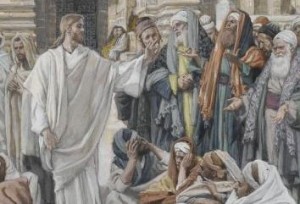
While many believed in Jesus and his message, many others, including the religious leaders, opposed him. Some openly mocked him when he warned them about their sin of unbelief. It’s impossible to be indifferent to Jesus’ word and his judgments. We are either for him or against him. There is no middle ground or neutral parties. When Jesus spoke about going away he was speaking about his return to his Father and to his glory. His opponents could not follow him because by their continuous disobedience to the word of God and their refusal to accept him, they had shut themselves off from God. Jesus warned them that if they continued to refuse him they would die in their sins. Jesus’ words echoed the prophetic warning given to Ezekiel (see Ezekiel 3:18 and 18:18) where God warns his people to heed his word before the time is too late. God gives us time to turn to him and to receive his grace, but that time is right now.
To sin literally means to miss the mark or to be off target. The essence of sin is that it diverts us from God and from our true purpose in life – to know the source of all truth and beauty which is God himself and to be united with God in everlasting joy. When Adam and Eve first sinned, they hid themselves from God (Genesis 3:8-10). That is what sin does; it separates us from the One who is all loving, all-wise, and all-just. Jesus went on to explain that if people could not recognize him in his word, they would have the opportunity to recognize him when he is “lifted up”on the cross of Calvary. Jesus pointed to the atoning sacrifice of his life on the cross as the true source of healing and victory over the sin of the world. The sacrifice of Christ’s life on the cross for our sins is the ultimate proof of God’s love for us. God so loved the world that he gave us his only Son, that whoever believes in him should not perish but have eternal life (John 3:16). To fail to recognize Jesus and where he came from is to remain in spiritual darkness; to believe Jesus and his words is to walk in the joy and light of God’s truth. There are certain opportunities in life that come and do not return. Each of us is given the opportunity to know and to accept Jesus Christ, as our Lord and Savior. But that opportunity can be rejected and lost. Life here is limited and short, but how we live it has everlasting consequences. Do you take advantage of the present time to make room for God so that your life will count for eternity?
“Lord Jesus, grant this day, to direct and sanctify, to rule and govern our hearts and bodies, so that all our thoughts, words and deeds may be according to your Father’s law and thus may we be saved and protected through your mighty help.”
for the full reflection visit : Daily Reading and Meditation
Tags: catholic, catholic podcast, catholic prayer
This entry was posted on Tuesday, April 8th, 2014 at 12:08 am
You can follow any responses to this entry through the RSS 2.0 feed.
“Go, and do not sin again“
[powerpress]
an excerpt from today’s reflection by Don Schwager:
The Gospel accounts frequently describe how Jesus had to face unjust accusations made by the Pharisees, the ruling elders of Israel. They were upset with Jesus’ teaching and they wanted to discredit him in any way they could. They wanted to not only silence him, but to get rid of him because of his claim to speak with God’s authority. When a moral dilemma or difficult legal question arose, it was typical for the Jews to take the matter to a rabbi for a decision. The scribes and the Pharisees brought to Jesus a woman who had been caught in the act of adultery. John writes that they wanted to “test” Jesus on the issue of retribution so ” they might have some charge to bring against him” (John 8:6).
Jewish law treated adultery as a serious crime since it violated God’s ordinance and wreaked havoc on the stability of marriage and family life. It was one of the three gravest sins punishable by death. If Jesus said the woman must be pardoned, he would be accused of breaking the law of Moses. If he said the woman must be stoned, he would lose his reputation for being the merciful friend of sinners.
Jesus then does something quite unexpected – he begins to write in the sand. The word for “writing” which is used here in the Gospel text has a literal meaning “to write down a record against someone” (for another example see Job 13:26). Perhaps Jesus was writing down a list of the sins of the accusers standing before him. Jesus now turns the challenge towards his accusers. In effect he says: Go ahead and stone her! But let the man who is without sin be the first to cast a stone. The Lord leaves the matter to their own consciences.
Pardon, restoration, and new life
When the adulterous woman is left alone with Jesus, he both expresses mercy and he strongly exhorts her to not sin again. The scribes wished to condemn, Jesus wished to forgive and to restore the sinner to health. His challenge involved a choice – either to go back to her former way of sin and death or to reach out to God’s offer of forgiveness, restoration, and new life in his kingdom of peace and righteousness. Jesus gave her pardon and a new start on life. God’s grace enables us to confront our sin for what it is – unfaithfulness to God, and to turn back to God with a repentant heart and a thankful spirit for God’s mercy and forgiveness. Do you know the joy of repentance and a clean conscience?
“God our Father, we find it difficult to come to you, because our knowledge of you is imperfect. In our ignorance we have imagined you to be our enemy; we have wrongly thought that you take pleasure in punishing our sins; and we have foolishly conceived you to be a tyrant over human life. But since Jesus came among us, he has shown that you are loving, that you are on our side against all that stunts life, and that our resentment against you was groundless. So we come to you, asking you to forgive our past ignorance, and wanting to know more and more of you and your forgiving love, through Jesus Christ our Lord.” (Prayer of Saint Augustine)
for the full reflection visit : Daily Reading and Meditation
Tags: catholic, catholic podcast, catholic prayer
This entry was posted on Monday, April 7th, 2014 at 6:41 am
You can follow any responses to this entry through the RSS 2.0 feed.
“Reaction to Jesus’ words“
[powerpress]
an excerpt from today’s reflection by Don Schwager:
When resistance and opposition to God’s word rears it head how do you respond? With fear and doubt? Or with faith and courage? The prophet Jeremiah was opposed by his own people because the words he spoke in God’s name did not sit right with them. They plotted to silence him and to “cut him off from the land of the living” (Jeremiah 11:19). Jeremiah responded with meekness and prophetic insight “like a gentle lamb led to the slaughter” (Jeremiah 11:18).
No one could be indifferent for long when confronted with Jesus and his message. It caused division for many in Israel. Some believed he was a prophet, some the Messiah, and some believed he was neither. The reaction of the officers was bewildered amazement. They went to arrest him and returned empty-handed because they never heard anyone speak as he did. The reaction of the chief priests and Pharisees was contempt. The reaction of Nicodemus was timid. His heart told him to defend Jesus, but his head told him not to take the risk.
Who is Jesus for you? And are you ready to give him your full allegiance? There will often come a time when we have to take a stand for Christ and for the gospel. To stand for Jesus may provoke mockery or unpopularity. It may even entail hardship, sacrifice, and suffering. There are fundamentally two choices we must choose between: to have our lives fueled by God’s selfless love for others or by our own self-centered love and selfish desires, to be loyal to God’s wise rule and kingdom laws or to the standards of a worldly kingdom opposed to God, to be servants of Jesus our Master or slaves of sin and Satan. Are you ready to stand for Jesus and to show him honor and loyalty whatever it may cost you?
“Lord Jesus, your Gospel brings joy and freedom. May I be loyal to you always, even though it produce a cross on earth, that I may share in your crown in eternity.”
for the full reflection visit : Daily Reading and Meditation
Tags: Lord Jesus, prophet Jeremiah
This entry was posted on Saturday, April 5th, 2014 at 12:36 am
You can follow any responses to this entry through the RSS 2.0 feed.
“The Father’s witness“
[powerpress]
an excerpt from today’s reflection by Don Schwager: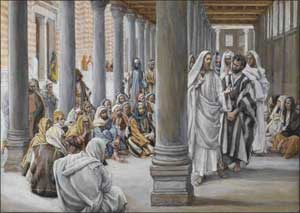
Do you know the joy of the gospel and a life fully submitted to Jesus Christ? Jesus’ opponents refused to accept his divine authority and claim to be the only begotten Son from the Father. They demanded evidence for his Messianic claim and equality with God. Jesus answers their charges with the supporting evidence of witnesses. The law of Moses had laid down the principle that the unsupported evidence of one person shall not prevail against a man for any crime or wrong in connection with any offence he committed (see Deuteronomy 17:6). At least two or three witnesses were needed. Jesus begins his defense by citing John the Baptist as a witness, since John publicly pointed to Jesus as the Messiah and had repeatedly borne witness to him (see John 1:19, 20, 26, 29, 35, 36). Jesus also asserts that a greater witness to his identity are the signs and miracles he performed. He cites his works, not to point to himself but to point to the power of God working in and through him. He cites God the Father as his supreme witness.
Jesus asserts that the scriptures themselves, including the first five books of Moses, point to him as the Messiah, the promised Savior. The problem with the scribes and Pharisees was that they did not believe what Moses had written. They desired the praise of their fellow humans and since they were so focused on themselves, they became blindsighted to God. They were so preoccupied with their own position as authorities and interpreters of the law that they became hardened and unable to understand the word of God. Their pride made them deaf to God’s voice. Scripture tells us that God reveals himself to the lowly, to those who trust not in themselves, but who trust God and listen to God’s word with an eagerness to learn and to obey. The Lord Jesus reveals to us the mind and heart of God. Through the gift of the Holy Spirit he opens our ears so that we may hear his voice and he fills our hearts and minds with the love and knowledge of God.
“Lord Jesus, fill me with your Holy Spirit that I may listen to your word attentively and obey it joyfully.”
for the full reflection visit : Daily Reading and Meditation
Tags: God the Father, Jesus, Lord Jesus, The law of Moses
This entry was posted on Thursday, April 3rd, 2014 at 12:04 am
You can follow any responses to this entry through the RSS 2.0 feed.
“Unless you see signs and wonders you will not believe”
[powerpress]
an excerpt from today’s reflection by Don Schwager:
Do you approach the Lord Jesus with expectant faith for healing, pardon, and transformation in Christ-like holiness? Isaiah prophesied that God would establish a new heavens and earth when he came to restore his people. Jesus’ miracles are signs that manifest the presence and power of God’s kingdom. When a high ranking official, who was very likely from King Herod’s court, heard the reports of Jesus’ preaching and miracles, he decided to seek Jesus out for an extraordinary favor. If this story happened today the media headlines would probably say: “High ranking official leaves capital in search of miracle cure from a small town carpenter.”
It took raw courage for a high ranking court official to travel twenty miles in search of Jesus, the Galilean carpenter. He had to swallow his pride and put up with some ridicule from his cronies. And when he found the healer carpenter, Jesus seemed to put him off with the blunt statement that people would not believe unless they saw some kind of miracle or sign from heaven. Jesus likely said this to test the man to see if his faith was in earnest. If he turned away discouraged or irritated, he would prove to be insincere. Jesus, perceiving his faith, sent him home with the assurance that his prayer had been heard. It was probably not easy for this man to leave Jesus and go back home only with the assuring word that his son would be healed. Couldn’t Jesus have come to this man’s home and touched his dying child? The court official believed in Jesus and took him at his word without doubt or hesitation. He was ready to return home and face ridicule and laughter because he trusted in Jesus’ word.
God’s mercy shows his generous love – a love that bends down in response to our misery and wretchedness. Is there any area in your life where you need healing, pardon, change, and restoration? If you seek the Lord with trust and expectant faith, he will not disappoint you. He will meet you more than half way and give you what you need. The Lord Jesus never refused anyone who put their trust in him. Surrender your doubts and fears, your pride and guilt at his feet, and trust in his saving word and healing love.
“Lord Jesus, your love never fails and your mercy is unceasing. Give me the courage to surrender my stubborn pride, fear and doubts to your surpassing love, wisdom and knowledge. Make be strong in faith, persevering in hope, and constant in love.”
for the full reflection visit : Daily Reading and Meditation
Tags: catholic, catholic podcast, catholic prayer
This entry was posted on Monday, March 31st, 2014 at 12:15 am
You can follow any responses to this entry through the RSS 2.0 feed.

